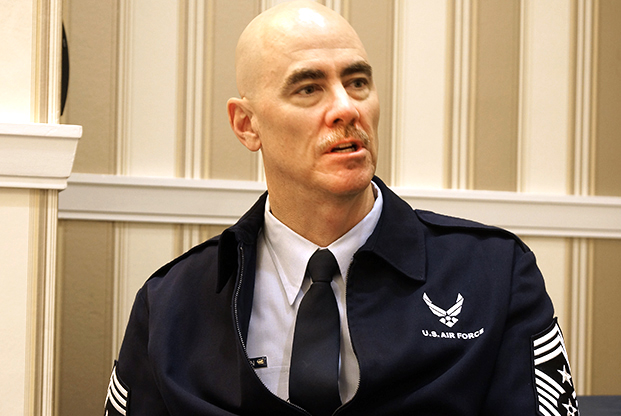
CMSgt. Ronald Anderson, command chief master sergeant for the ANG, discusses resiliency issues during a Sept. 18 interview with Air Force Magazine in National Harbor, Md., near Washington, D.C. Staff photo by Mike Tsukamoto.
The Air National Guard is exploring the possibility of placing first sergeants, chaplains, and ANG mental health staffers with top secret clearances in its RPA squadrons so Guard airmen can confide in and seek assistance from mental health and/or emotional support staff without breaking the law, CMSgt. Ronald Anderson, command chief master sergeant for the ANG, told Air Force Magazine on Sept. 18.
Anderson said ANG is cognizant of the unique strain placed on RPA wings, whose heavy taskings mean their airmen “are pulling, you know, seven days a week or six days a week or even five days a week, with … 10 hours a day flying a line in a box” and carrying out “real-live missions that are happening in … other countries,” Anderson told Air Force Magazine in an interview at AFA’s 2019 Air, Space & Cyber Conference in National Harbor, Md.
“I’d be lying to you if I tried to tell you that I understood 1/100th of what those airmen go through, ‘cause I don’t,” he said. “I don’t know what it’s like to live knowing that you’re performing an overseas mission and then you go, you know, teach your son or daughter’s softball team that night.”
But he said the issue of RPA airmen needing to talk about their experiences behind the controls but not being allowed to open up to ANG psychological health staff members because they’re not cleared is a real problem.
Anderson said ANG isn’t trying to tell commanders how to do their jobs or care for their airmen.
“What we’re trying to say is commander, chief, we wanna give you as many resources as we can,” he said. “If you’re an RPA unit, you probably need something that looks and shapes like this.”
While the idea is still “an aspirational thing” at this point, Anderson said ANG has thus far ensured that some of its first sergeants and chaplains have top secret clearances. He said his team is also mulling questions like how much to pay ANG mental health professionals who will need to have the extensive security clearances necessary to fill these potential new roles.
And while Anderson said resources are a challenge, noting that “there’s a dollar bill associated with this stuff,” he said that won’t stop the Air Force and ANG from supporting airmen.
Creech AFB, Nev., and Air Force Special Operations Command have previously undertaken similar initiatives, Air Force Times reported in 2015, assembling so-called “Human Performance Teams” composed of chaplains, scientists, and medical professionals whose clearances allowed them to confer with struggling airmen who might not otherwise be allowed to open up to them.
The Veterans Crisis Hotline is available 24 hours a day, seven days a week, for veterans, service members, and their family members and friends who need help. Call 800-273-8255 and press 1, text 838255, or visit www.veteranscrisisline.net.
